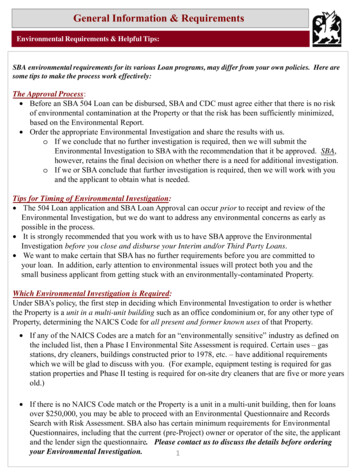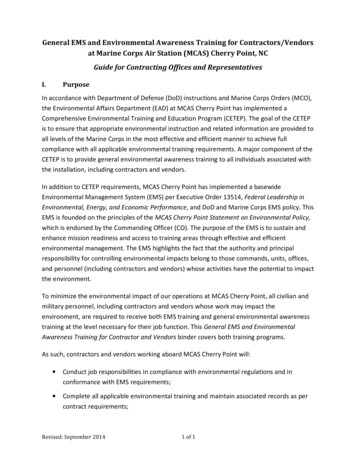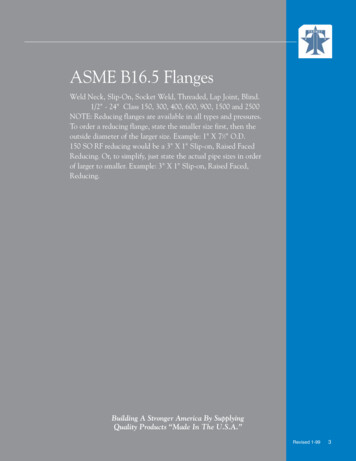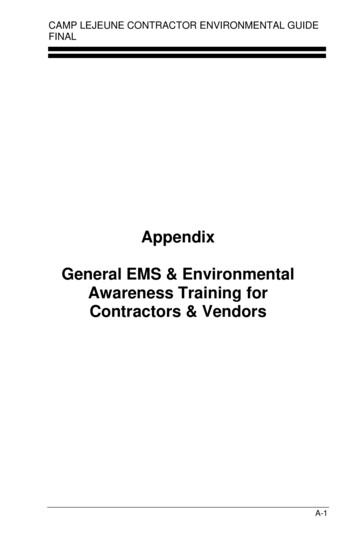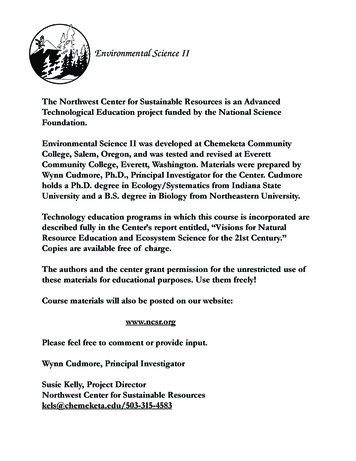
Transcription
Sustainable Holiday Greening GuideTips for reducing your environmental impact during theholiday seasonThis guide was prepared by the Sustainability and Environmental Management Office at Vanderbilt University. For moreinformation on greening your holidays or Vanderbilt’s sustainability programs, please contact us at 615.322.4551 orsustainvu@vanderbilt.edu.December, 2016
Sustainability is achieved when the needs of the present population are met withoutcompromising the ability of future generations to meet their own needs. To achievesustainability, we should examine the impact that our activities have on the environment andimplement ways to reduce our consumption of resources and our generation of waste. Inkeeping with the efforts of Vanderbilt to become part of a more sustainable community, theSustainability and Environmental Management Office has developed this Sustainable HolidayGreening Guide in order to provide the Vanderbilt community with tips to lessen theirenvironmental impact during the holidays.The holiday season brings good cheer to many people and is awonderful time to celebrate with colleagues, friends, and family. Anunintended side effect is that the holidays are also a time of excessivegeneration of solid waste and consumption of natural resources.Did you know ? Americans throw away about 25% more trash between Thanksgiving and New Year’sEve1. If every family reused just two feet of holiday ribbon, the 38,000 miles of ribbon savedcould tie a bow around the entire planet2. Half of the paper America consumes is used to wrap and decorate consumer products3. The average Christmas/New Year’s long-distance trip is 275 miles long4.These guidelines were developed to help you think about the environmental impact of theholidays and provide some tips on how to minimize your impact as much as possible.Green Giving and ShoppingThe exchange of gifts and cards during the holidays has become an American tradition. About6.5 billion cards are sold in the United States each year5—that’s enough to fill a footballstadium almost 25 stories high2. Excessive gift-giving not only takes its toll on our wallets, italso harms the environment. Millions of tons of paper products and packaging are taken to thelandfill during the holiday season. These tips will help you to reduce the environmental impactof your shopping and giving this year.“Greening the Season.” EPA Pacific Southwest, Region 9. .html“42 Ways to Trim Your Holiday Wasteline.” Use Less Stuff. http://www.use-less-stuff.com/ULSDAY/42ways.html3 “Facts on Holiday Waste.” RecycleWorks. http://www.recycleworks.org/resident/holiday facts.html4“U.S. Holiday Travel.” Bureau of Transportation dot.gov.bts/files/publications/america on the go/us holiday travel/html/entire.html5 “Hallmark Card Statistics.” Statistics Brain. 6/07/About-Greeting-CardsGeneral-Facts.pdf122
Holiday Cards Instead of sending holiday cards via postal or campus mail to your colleagues, clients,friends, and family, consider sending e-cards. A few good sites to consider are care2,123Greetings, and BlueMountain. You will save trees, save greenhouse gas emissionscreated during the transportation of the cards, save pollution from the printing process,and even save some money! Make a phone call to wish someone a happy holiday instead of sending them a card.This is a better way to really connect with people! If you send cards, choose cards that are printed with vegetable-based inks on paper withrecycled content. For example, Seltzer makes all of their products, including gift cards,envelopes, and gift wrap, from 100% post-consumer content paper and Fishlips makesgift wrap and paper products with recycled paper and soy ink. If you choose to send cards, consider buying those that provide a donation to a favoritecharity. One good option is the Vanderbilt Children’s Hospital Holiday Project. Reuse the front of greeting cards as colorful postcards or gift tags.Gifts You might find the perfect pre-loved gift, such as a book, picture frame, or sweaterwhile keeping usable goods out of the landfill by using the Vandy FreeSwap section ofthe Vanderbilt Classifieds, where Vanderbilt students, faculty and staff are giving away(and getting) free, usable, unwanted items. Consider gifts that support your local community and generateminimal waste. This includes things like sports tickets such asVandy football or baseball, theater or performance tickets,charitable donations, or gift certificates. Give a gift that helps someone go green. Items such as energysaving power strips, motion sensor lights, reusable stainlesssteel water bottles, and reusable cloth shopping bags are greatsustainable gifts. Give the gift of your time. Volunteer for a charitable organization in lieu of a gift. Offeryour friends and family an evening of babysitting or a home-cooked meal. Re-gift! Give a past present you didn’t need or want to someone you think mightappreciate it. Try to purchase items locally to help small merchants, drive less, and support the localeconomy. Antique and thrift stores are also great places to find unique gifts. Give a colleague an electronic magazine subscription. Give the gift of a membership to a local organization in which the recipient is interested.Plant a tree or donate a book to a local or school library in someone’s honor. Read about Vanderbilt University’s library gift policy. Read about ways to support the Nashville Public Library. Read about giving trees through the Arbor Day Foundation.3
Support the military through monetary donations, Operation Phone Home, or OperationCare Package. Instead of buying gifts for your colleagues, consider organizing a group to support aneedy Vanderbilt family with gift cards through the Employee Assistance Program(615.936.1327) or adopt an Angel through the Susan Gray School (615.322.8200). Purchase gifts that are fair-trade, locally made or grown, or organically grown, such ascoffee or chocolate. Several great local places to shop for these items include: Ten Thousand Villages Scarlett Begonia Whole Foods Olive and Sinclair chocolates If you plan to purchase electronics this holiday season, try looking for the most energyefficient models, which are generally designated with Energy Star labels from the U.S.EPA. Great ideas for green gifts can also be found through Treehugger. Unsubscribe! Call or email catalog companies that send holiday catalogs to your officeand home and ask to be removed from their mailing lists. To make it easy, CatalogChoice will allow you to cancel nearly all catalogs in one location.Packaging Put gifts in reusable packaging, such as baskets, bags, or fabric wrappers. Try packaging this year’s gifts in comics, newspaper, old maps, or brown paperdecorated with sponge art or drawings instead of wrapping paper so your presents’packaging can be recycled after the holidays. Recycled aluminum foil can also make for afun and different approach to wrapping. Natural fiber raffia works well as a substitute for ribbon and is recyclable too! Also lookinto twine or yarn made with recycled material. If purchasing wrapping paper, find responsible gift wrap that is made with postconsumer recycled content. Visit Nashville Wraps, Seltzer, or Fish Lips Paper Designs formore information on eco-friendly wrapping paper. Look for paper printed with plantbased inks instead of harmful petroleum based products. Reuse old boxes and packaging materials such as Styrofoam peanuts, or donate them tomail centers. Any UPS store will accept peanuts for reuse in any quantity and in anycontainer. Bring your own tote bags in which to carry your purchases when you go shopping. Online shopping keeps you out of your car and off the roads, and may curb impulsebuying. However, consider how far your purchases have to travel to reach you. Plan ahead and consolidate your shopping trips to save time, gas, and hassle. Try to getall of your shopping done at several stores that are near each other.4
Holiday DecoratingChristmas TreesChoosing between an artificial tree and a real tree can be a difficultdecision. Here are some things to consider while decorating for theholidays: Consider buying a live tree with a rootball that is native to thearea. After the holidays, plant it in your yard. Recycle your real tree following the holidays—they make greatmulch! Decorate an indoor plant instead of a tree this year. If you do purchase an artificial tree, be sure to use it for many years. Artificial treesconsume energy and petroleum-based materials during their manufacture. If prelighted, be sure to buy one with LED (light-emitting diode) lights.Other Tips for Decorating Invest in LED (light-emitting diode) holiday lights, which use 90% less energy thantraditional incandescent lights and can last up to 100,000 hours! Host an old ornament swap with friends instead of purchasing new ones. Or, take a tripto your local antique shop or thrift store to find great vintage decorations. Check out the Vanderbilt Classifieds! You might find reusable, pre-loved decorationssuch as wreaths, ornaments, lights, tablecloths, and more. As an alternative to decorative string lights, use popcorn andcranberries, or colored raffia made with post-consumer recycledcontent. Make your own wreaths and table centerpieces using materialsfrom your yard or around your home. Conserve energy by only leaving holiday lights turned on for asmall period of time each night. You may want to place yourlights on self-timers that turn your lights on and off at pre-programmed hours so youdon’t forget or leave them on all night. Instead of traditional paraffin wax candles, use soy or beeswax candles. Made fromrenewable soybean oil or beeswax, these candles do not emit unsafe aromatichydrocarbons and produce less soot than paraffin candles. Soy and beeswax candlesare available at various local stores, including Target, Walmart, and Walgreens, and alsomake great gifts.5
Holiday EntertainingFoodWhether you are preparing a home-cooked holiday meal or hosting a holiday party, these tipswill help to make your meals more environmentally friendly. For sustainable food practices,consider the food itself, the transportation of the food, and the waste produced by foodpackaging. Sustainable food practices include: Grocery shopping at stores or hiring caterers who commit to using locally grown andorganic food. This greatly reduces the distance the food had to travel to your home orevent, making it fresher, and reducing the environmental impact of that transportationprocess. Using reusable china plates and utensils whenever possible,especially when hosting a large event, to reduce the waste ofdisposables.Several local companies who offer these products for rentalinclude: Art Pancake at 615.834.1234 Classic Party Rentals at 615.641.1111 Grand Central Party Rentals at 615.868.3747 Liberty Party Rental at 615.822.4392 If disposables must be used, here are some choices, recommended in order of leastenvironmental impact: 1) paper products with a high recycled content (i.e. paper cupsor napkins made with recycled paper), 2) bioware that is made of corn, potatoes, etc.that is biodegradable or compostable, or 3) recyclable plastic ware. Eliminate excess packaging by serving food in large containers instead of single-servings.Provide bulk water, coffee and drink dispensers instead of individually packagedproducts. Serve bite-sized or finger foods to minimize plate and utensil use. Get an accurate count of attendance before the event to eliminate excess food waste. Donate excess food to food banks, if possible. Make sure you call ahead to learn holidayhours of operation: Second Harvest Food Bank at 615.329.3491 Nashville Rescue Mission at 615.255.2475Alternative Food OptionsDid you know that the meat production industry is resource intensive, consuming fossil fuels,water, and land; and creating pollution and greenhouse gas emissions? The production ofchicken and turkey has considerably less impact on the environment than other meats, such asbeef and lamb.6
Seek free-range and/or locally raised meat for your holiday celebrations. Consider serving or eating less meat this year and serving vegetarian- and/or veganfriendly alternatives to turkey or ham at your holiday celebrations. Several optionsinclude: Field Roast’s Celebration Roast and Gardein Stuffed Turk'y Roast are greatvegetarian-friendly options that are stuffed with fruits and vegetables andseasoned with savory spices. Tofurky Roasts are available in many grocery stores and at VU’s Holiday GiftGiveaway. Lentil loafs are another great option to traditional meat dishes. Consider serving hearty vegetable dishes, such as stuffed winter squashes, pumpkin,sweet potatoes, brussel sprouts, carrots, broccoli, swiss chard, mushrooms, and more!The recipes are endless! AllRecipes.com, FoodNetwork.com, and WholeFoodsMarket.com all publish numerousideas and recipes for celebrating the holidays with vegan, vegetarian, and gluten-freemenu options.Party Planning Publicize your event via email and the internet by sending online invitations. You willsave trees, save greenhouse gas emissions created during the transportation of theinvitations, save pollution from the printing process, and even save some money! If you do use printed materials, make sure invitations are printed on paper with postconsumer recycled content with vegetable-based inks. Decorate using items you already have or ones that you can borrow from friends. Alsoconsider decorations that can be reused and enjoyed after your event, such as wholefruit, small plants, or herbs.Other Entertaining Tips Request recycling bins for your holiday event here at Vanderbilt: For events held on Vanderbilt’s campus, include a requestfor recycling on your work order to Plant Operations. Ifyou don’t have a work order for your party, you cancontact Vanderbilt’s recycling coordinator at 615.34.EARTH(343.2784) or recycle@vanderbilt.edu. If you are not serviced by Plant Operations, you can specifywithin your catering contract that the caterer providerecycling containers and remove the recycling when theyleave. Place recycling containers next to trash bins for easy access. Announce to guests what and where to recycle. Kids love to recycle so put them in charge of collecting recyclables at family events.7
Click here or visit your local community’s website to find locations where you can takerecyclables. When hosting a party, lower the thermostat. More people in an area means more bodywarmth.Travel Encourage and participate in carpooling to and from holiday celebrations. If driving long distances, be sure to check the air in your tires to achieve optimal gasmileage while traveling. If flying, consider offsetting the carbon emissions of your flight.Helpful information can be found through Terrapass.com,carbonfund.org, myclimate.org, and nativeenergy.com. If you will be away from home or the office for long periods oftime, remember to set your thermostat to a lower temperatureor program the vacation setting on your programmablethermostat. While you are on vacation turn down your electric and gaswater heaters to conserve energy and gas.8
Thank you for your interest in creating a “greener” Vanderbilt andMiddle Tennessee.Check out SustainVU’s other Sustainability Guides.For more information on any of the greening suggestions above orgeneral sustainability information, please visitwww.vanderbilt.edu/SustainVU.If you would like to receive monthly email newsletters fromSustainVU, send an email to sustainvu@vanderbilt.edu and let usknow.Connect with SustainVU on social media:@SustainVU @SustainVUVanderbilt @SustainVUFor additional assistance with greening your department or school,please contact the Sustainability and Environmental ManagementOffice at 615.322.4551 or sustainvu@vanderbilt.edu.9
charity. One good option is the Vanderbilt Children’s Hospital Holiday Project. Reuse the front of greeting cards as colorful postcards or gift tags. Gifts You might find the perfect pre-loved gift, such as a book, picture frame, or sweater while keeping usable goods o



